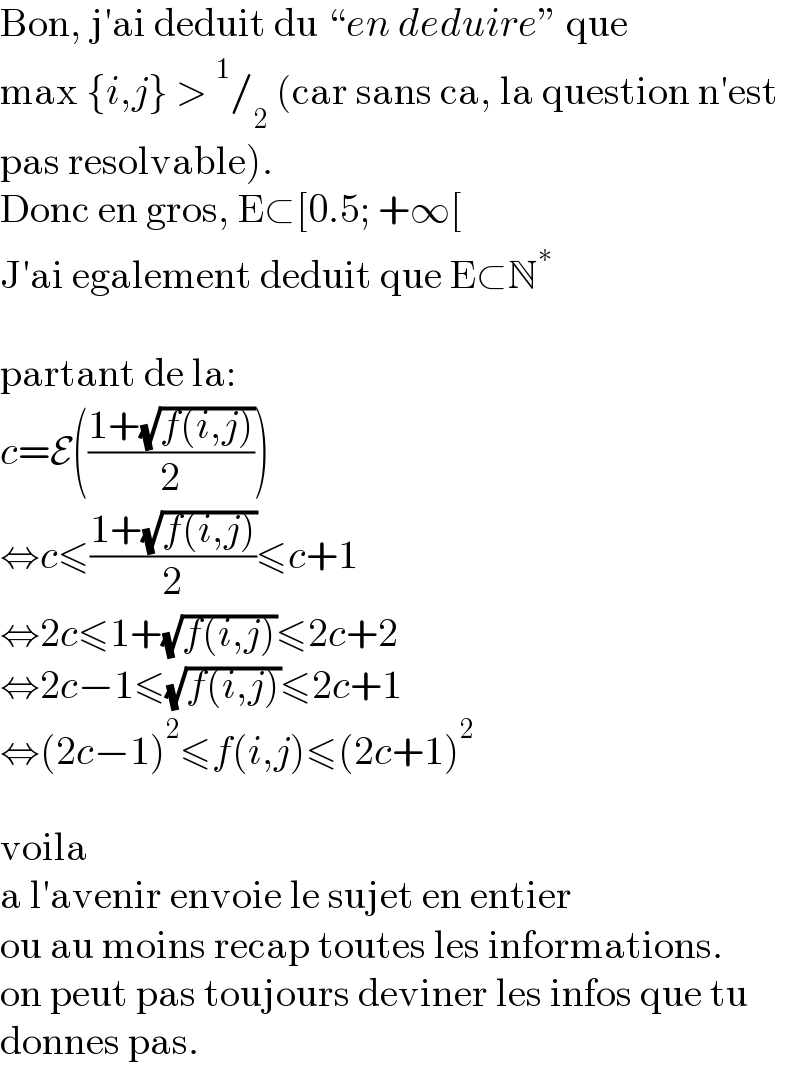Question Number 177476 by Skabetix last updated on 05/Oct/22

Commented by Slomenist1 last updated on 05/Oct/22

$${bonjour}\:{stp}\:{donne}\:{la}\:{serie}\:{complete}\:{elle}\:{semble}\:{belle} \\ $$$$ \\ $$
Commented by Skabetix last updated on 06/Oct/22

Commented by Skabetix last updated on 06/Oct/22

$${bonjour}\:{voici}\:{l}\:{enonce}\:{au}\:{complet} \\ $$
Commented by TheHoneyCat last updated on 08/Oct/22
L'inégalité se prouve comme pour tes questions 2 et 3.
Je peux pas te donner le détail, vu que, bah, non, le sujet est pas donné en entier.
E₁ E₂ E₃ et E₄ ne sont pas définis.
Mais vu la tronche des questions, la preuve doit être identique.
Answered by TheHoneyCat last updated on 08/Oct/22

$$\mathrm{Bon},\:\mathrm{j}'\mathrm{ai}\:\mathrm{deduit}\:\mathrm{du}\:“{en}\:{deduire}''\:\mathrm{que}\: \\ $$$$\mathrm{max}\:\left\{{i},{j}\right\}\:>\:^{\mathrm{1}} /_{\mathrm{2}} \:\left(\mathrm{car}\:\mathrm{sans}\:\mathrm{ca},\:\mathrm{la}\:\mathrm{question}\:\mathrm{n}'\mathrm{est}\right. \\ $$$$\left.\mathrm{pas}\:\mathrm{resolvable}\right). \\ $$$$\mathrm{Donc}\:\mathrm{en}\:\mathrm{gros},\:\mathrm{E}\subset\left[\mathrm{0}.\mathrm{5};\:+\infty\left[\right.\right. \\ $$$$\mathrm{J}'\mathrm{ai}\:\mathrm{egalement}\:\mathrm{deduit}\:\mathrm{que}\:\mathrm{E}\subset\mathbb{N}^{\ast} \\ $$$$ \\ $$$$\mathrm{partant}\:\mathrm{de}\:\mathrm{la}: \\ $$$${c}=\mathcal{E}\left(\frac{\mathrm{1}+\sqrt{{f}\left({i},{j}\right)}}{\mathrm{2}}\right) \\ $$$$\Leftrightarrow{c}\leqslant\frac{\mathrm{1}+\sqrt{{f}\left({i},{j}\right)}}{\mathrm{2}}\leqslant{c}+\mathrm{1} \\ $$$$\Leftrightarrow\mathrm{2}{c}\leqslant\mathrm{1}+\sqrt{{f}\left({i},{j}\right)}\leqslant\mathrm{2}{c}+\mathrm{2} \\ $$$$\Leftrightarrow\mathrm{2}{c}−\mathrm{1}\leqslant\sqrt{{f}\left({i},{j}\right)}\leqslant\mathrm{2}{c}+\mathrm{1} \\ $$$$\Leftrightarrow\left(\mathrm{2}{c}−\mathrm{1}\right)^{\mathrm{2}} \leqslant{f}\left({i},{j}\right)\leqslant\left(\mathrm{2}{c}+\mathrm{1}\right)^{\mathrm{2}} \\ $$$$ \\ $$$$\mathrm{voila} \\ $$$$\mathrm{a}\:\mathrm{l}'\mathrm{avenir}\:\mathrm{envoie}\:\mathrm{le}\:\mathrm{sujet}\:\mathrm{en}\:\mathrm{entier} \\ $$$$\mathrm{ou}\:\mathrm{au}\:\mathrm{moins}\:\mathrm{recap}\:\mathrm{toutes}\:\mathrm{les}\:\mathrm{informations}. \\ $$$$\mathrm{on}\:\mathrm{peut}\:\mathrm{pas}\:\mathrm{toujours}\:\mathrm{deviner}\:\mathrm{les}\:\mathrm{infos}\:\mathrm{que}\:\mathrm{tu} \\ $$$$\mathrm{donnes}\:\mathrm{pas}. \\ $$
